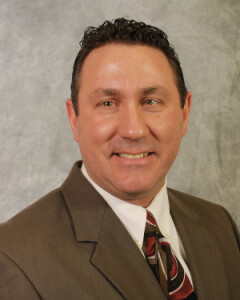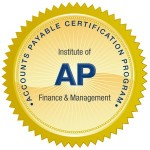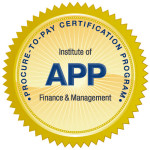
- Membership
- Certification
- Events
- Community
- About
- Help
The IOFM Ask the Expert panelists are the folks who offer up their industry knowledge and experience to answer member questions. For our podcast series, we’re speaking to them one-on-one about topics that are of particular interest to them, sharing their insight, experience and stories. Join us—have a listen!
Hosted by Royce Morse, IOFM Managing Editor
In this podcast, IOFM Advisory Panelist David Glass discusses virtual card programs and the benefits for both his organization and the vendors—faster payments for vendors, less time and money spent processing paper checks for his organization. Through the combined efforts of his team and his card provider, WVU Medicine continues to grow the program, making AP a profit center within just three years.

David O. Glass, MBA
Enterprise Director of Accounts Payable, West Virginia University Health System
David O. Glass, MBA, is Enterprise Director of Accounts Payable, West Virginia University Health System. David is an accomplished accounts payable leader supporting operations across five states. Over the past five years, he not only created the centralized accounts payable department across the WVU Medicine organization, but integrates two to three acquisitions per year, all while achieving best-in-class performance levels.
Interviewer: Welcome to "Meet the Experts," an IOFM podcast series designed to introduce you to many of the more than 200 panelists that answer your "Ask the Expert" questions. "Ask the Expert" is a popular feature allowing our members to ask fellow AP and AR practitioners any work-related questions, and get answers back within five business days. I'm [Royce Morris], Institute of Finance and Management's managing editor.
Today I'm speaking with David Glass, MBA, Enterprise Director of Accounts Payable for West Virginia University Health System. Welcome, David. So, we're here today to talk about your virtual card program. Let me ask you this first: What got you interested in a virtual card program to begin with?
00:00:50.5
David Glass: Improving cashflow and generating a revenue share was secondary.
Interviewer: Okay. What were the challenges that you were specifically looking to solve with it? Were you having issues with payments, or was this strictly a cash-flow motivator?
David Glass: In my current role, we still pay almost all vendors by check, so [with] delays in mail and looking for alternatives, the virtual card made sense to where we could be creative in the timing of payments. That allowed us to improve performance of on-time payments, while generating a revenue share at the same time.
Interviewer: Understood. So, how involved were you with selecting the program you ended up going with and getting it set up?
00:01:54.3
David Glass: So, I did not select the vendor, in my current role. They had started the program the year prior to my joining. But that was one of the reasons for me being selected for my role is I had experience in implementing the program, so I came in with some high goals and have lived up to them.
Interviewer: Well, that's wonderful to hear. Tell me about your previous experience with card programs, and kind of what informed you about that, that you felt like you wanted to bring it to this role.
David Glass: It was in a manufacturing environment, where now I'm in a healthcare environment. In manufacturing, it was all about cashflow and any alternative. We had lots of flexibility in what we were able to implement. So, it was really being creative with the cashflow.
00:02:57.2 In that environment, we had pushed a lot of our vendors out to net 90 terms. With the program that I had implemented there, I was able to tell a vendor, "I'll initiate payment to you at the end of the following month for all invoices." So, anything in July would be paid on August 31st. To the vendor, that effectively meant that I averaged 45-day payment terms with them compared to 90. With that provider, I had 45 days to pay them based on the cycle date, because that was day one of the new cycle. So, I had the full cycle of 30 days, plus some additional 15, to pay them. So, that continued my cashflow out to the 90 days. But, at the same time, I generated the revenue share and the vendor was getting paid a lot sooner.
00:04:03.4 We grew that program very quickly. I had one of the fastest growth rates that they had implemented.
Interviewer: Wow. So, how did you go about contacting your vendors and getting them to buy into the program?
David Glass: In my role now, in healthcare, what we have done is, as part of our work document imaging and workflow solution, we have a step within that that does a check and says, if this is a new vendor and they haven't been paid before, look at the invoice and see if they offer to accept credit card. If they do, then we automatically enroll them in the virtual card program, where we'll make that initial payment to them, but then we ask them if they will accept the email directly from the vendor, or the notification.
00:05:04.9 And then, within that workflow, every 90 days we follow up with an additional review to see if the vendor has changed anything. If they didn't accept in the past, do they accept now? And then we have our provider do an annual campaign, and, with all the new vendors created each month, we send those to the provider to review and attempt the campaign with them.
Interviewer: Understood. So, that's great that they're partnering with you to try and get more vendors on board with the program. Do you meet any resistance from vendors? And if so, why?
00:05:48.2
David Glass: Some is that they look at it and they say, "There's a fee." And where I can have a personal conversation with them and I say, "Have you compared the cost of your lockbox service to card acceptance?" Some folks will realize that on lower-dollar invoices it is cheaper to accept a credit card.
Interviewer: That's interesting. I hadn't thought about the lockbox charge. Is that effective? What percentage of vendors do you have on board with your program now?
David Glass: We have about 9,000 active vendors, and almost 10% participate with our virtual card program.
Interviewer: I see. And I assume you're looking to increase that number. What's your projected growth rate for that?
00:06:47.3
David Glass: We have grown from, in 2016, when I took ownership of the program, more than 100% every year.
Interviewer: Impressive.
David Glass: We continue that this year. Last year, we grew 34%. This year, year-to-date, we've grown 7%. We've targeted at least 10% growth every year.
Interviewer: Interesting. Are there certain types of vendors or certain dollar-volume vendors that don't want to and probably never will sign up for the program?
David Glass: The larger vendors that are publicly traded, sometimes they can go to market and get credit lines at a lower cost. A lot of the smaller vendors, when we offer to pay everything at the earliest point in that card cycle, they're happy to accept one payment at the beginning of that timeframe, instead of every day or every week.
00:08:08.7
Interviewer: Yeah, that makes a lot of sense. They get paid a lot faster.
David Glass: Yeah. From a cashflow standpoint, if I pay a vendor on the 1st of the month or the 31st, it doesn't make a difference. It goes to the card provider the same day. So, why not pay them as early in that cycle as I can?
Interviewer: Yeah, that's a good point. So, if you were looking to suggest a virtual card program to somebody, another IOFM member, let's say, who's thinking about doing that right now, what would you tell them? What advice would you give them?
00:08:50.4
David Glass: My advice is to really review the user experience for the recipient. If the card provider, if they click on a link and it's troublesome for them to navigate and retrieve that information, or it can't be automated at all, I would avoid those providers.
Interviewer: I see. Do you know if your organization did a—I'm sure they did a formal review of different card providers before selecting the one that you're using now?
David Glass: Yeah. There was a number of vendors. We renewed our contract with them two years ago. That was one of the reviews that we did again was the enduser experience of how they're getting those card numbers, how they retrieve them, how many, what percentages, and automate a solution so that it's even more advantageous for that vendor to participate.
Interviewer: Yeah, that makes a lot of sense. If you want people to participate, you have to make it easy to do business with you in that way. It sounds like you have a good vendor who partners with you and helps you get more vendors on board with it.
00:10:21.6
David Glass: From an internal—how easy is it to reconcile when a vendor doesn't take the payment right away, or when a vendor refunds back to that virtual card, how easy is it for you to identify the credit and apply that accurately in your ERP system?
Interviewer: Yeah, that makes a lot of sense. The money may flow both ways, so you have to be prepared to manage that process as well in a way that keeps your books balanced and you know what you're dealing with. That's a good point.
00:11:01.4
David Glass: And then the last thing is regular communication, so we have a standing call with our account manager every month, and then twice a year the leaders from the partner come in and meet with me and review the ups, downs, and we tackle things together, rather than them just dictating how it's going to be.
Interviewer: Yeah, that's a good way to approach it. Since it has to work for the vendors and it has to work for you, too—it has to work for accounts payable—it sounds like you've got a pretty good system going.
00:11:50.2
David Glass: Yeah. I always ask in each review, "How are we performing?" It's beneficial for them to help me to grow the program, and it's a two-way street.
Interviewer: Absolutely. Any final words on virtual card programs for us, David?
David Glass: I'd just say you shouldn't be afraid of them, but it does take the research and understanding how the programs work, what's the pros and cons of each vendor's offerings. With the right partner, you can make an impact. Right now, my revenue share exceeds my department cost by 50%.
Interviewer: That's fantastic.
David Glass: I'm generating mid-six figures revenue share over my department's cost.
Interviewer: So, you're a profit center, in other words?
David Glass: Yeah. I've been a profit center for the last three years.
Interviewer: That's fantastic. That's a great selling point, I would have to say. Well, thank you so much for your time. I appreciate it. Looking forward to talking to you again. Thank you, David.
David Glass: Thank you.
00:13:16.9
Interviewer: Thank you for listening to "Meet the Experts," an IOFM podcast series. Remember, if you have a question for our guest or any of our experts, be sure to log in to IFOM.com/ask-the-experts.
Continuing Education Credits available:
Receive 1 CEU per hour of listening time towards IOFM programs:

 Receive 1 CEU per hour of listening time towards maintaining any AP and P2P related program through IOFM! These programs are designed to establish standards for the profession and recognize accounts payable and procure-to-pay professionals who, by possessing related work experience and passing a comprehensive exam, have met stringent requirements for mastering the financial operations body of knowledge.
Receive 1 CEU per hour of listening time towards maintaining any AP and P2P related program through IOFM! These programs are designed to establish standards for the profession and recognize accounts payable and procure-to-pay professionals who, by possessing related work experience and passing a comprehensive exam, have met stringent requirements for mastering the financial operations body of knowledge.
Continuing Education Credits available:
Receive 1 CEU per hour of listening time towards IOFM programs:

 Receive 1 CEU per hour of listening time towards maintaining any AP and P2P related program through IOFM! These programs are designed to establish standards for the profession and recognize accounts payable and procure-to-pay professionals who, by possessing related work experience and passing a comprehensive exam, have met stringent requirements for mastering the financial operations body of knowledge.
Receive 1 CEU per hour of listening time towards maintaining any AP and P2P related program through IOFM! These programs are designed to establish standards for the profession and recognize accounts payable and procure-to-pay professionals who, by possessing related work experience and passing a comprehensive exam, have met stringent requirements for mastering the financial operations body of knowledge.
What are you waiting for?
